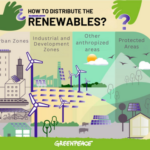BLOG
Originally published by Balkan Insight
Regional policymakers are making a mistake if they use soaring energy prices in the EU to justify a continued commitment to fossil fuel, and divert from energy transition commitments.
Electricity’s true cost is hidden
In the first half of 2021, household electricity prices in Western Balkans were relatively low, ranging from 0.0605 euros in Kosovo to 0.0980 per kWh in Serbia, well below the EU average of 0.2192 euro per kWh.
Electricity production in the Western Balkans relies mainly on coal-fired power plants. This outdated and inefficient fleet of plants is responsible for most greenhouse gas emissions in the energy sector, accounting for 75 per cent of the overall greenhouse gas emissions of the region.
Moreover, these power plants do not even comply with their own national pollution limits, emitting deadly amounts of poisonous pollutants, such as SO2, up to six times more than national limits,.
Policymakers in the region are using the soaring energy prices hitting the EU to justify their continued commitment to fossil fuel use in the region, claiming that domestically produced electricity from coal plants is the main reason why the energy crisis has not – yet – affected domestic prices.
While this may be true, to some extent, it shies away from the complete story. Serbian President Aleksandar Vucic recently said that while wholesale electricity prices on the market are high, the cost of electricity for Serbian citizens is low, due to subsidies. This clearly indicates that the true cost of coal in Serbia and the Western Balkans is hidden.
While Vucic sees subsidies for coal as a protective measure, their cost has been directly burdening Serbian citizens for years. From 2015 to 2019, the total cost of direct subsidies to the coal sector in Serbia was 388.11 million euros.Citizens of the whole region, apart from Albania, which does not have coal in its energy mix, paid 662.91 million euros.
Another cost that Western Balkan leaders do not factor into the real cost of the coal business, is the cost to health.
Recent analysis shows that estimated costs to public health in 2020 from coal-fired power plants ranged from 6 billion to 12.1 billion euros. This cost is borne not only by the citizens of Western Balkans but by the EU as well, due to the transboundary nature of pollution from coal plants.
The lagging energy transition
The Energy Community Treaty legally binds all six Western Balkan states, as Contracting Parties, to efforts to build a pan-European energy market.
This Treaty has so far been the driving force behind energy transition in the region, because through it the WB states commit to transposing the relevant EU acquis into national legislation. In this regard, the Western Balkans have committed to cooperate between themselves and the EU.
The importance of this Treaty has been further underpinned by the 2020 signing of the Sofia Declaration on the Green Agenda for the Western Balkans, in which the Western Balkan states committed to reaching climate neutrality by 2050, as their contribution to achieving the EU Green Deal.
However, the last Energy Transition Tracker of the Energy Community shows that the Western Balkans are lagging behind in their energy transition efforts.
While the EU has installed a cap and a trade system, EU ETS, on its emissions, the Western Balkan countries still do not have a carbon pricing mechanism that would make big polluters pay for their emissions.
Estimated CO2 emissions from the region would account for 1.2 billion euros at the average of the EU ETS price of 2020. This is distorting the level playing field between the EU and the Western Balkans electricity markets, putting further breaks on market integration.
There is work to be done in creating the conditions, and releasing the potential for energy efficiency and savings, and ramping up energy production from renewable sources.
Special attention should be given to introducing policies and measures within the National Energy and Climate Plans, a ten-year plan document for countries in the region to reach ambitious levels of greenhouse gases reduction by 2030, as well as credible renewable energy and energy efficiency targets.
Ramping up coal production is not the solution
The EU is currently looking into short and medium-term solutions to limit the impact of soaring energy prices on households and businesses for the upcoming winter, identifying measures to ensure the resilience and flexibility of the EU’s energy system.
Clearly, renewables, which have low operational costs and no fuel costs, are the only solution.
While ramping up coal production for this winter may look like saving citizens from increased bills, this is still accounted for through heavy subsidies and health costs and the reliance on fossil fuels must end.
The volatility and unreliability of fossil gas underpins the importance of clean and just energy transition, not only from the environmental perspective, but for cost effectiveness as well, due to the high subsidies and profit losses that utility companies in the region experience.
It is time the Western Balkans embraced technology, committed to its policy strategies and plans and used market solutions to put its energy transition on track – for the benefit of its own citizens, and so staying on the path towards decarbonisation by 2050.
By Viktor Berishaj , Energy and Climate Policy Coordinator for Southeast Europe at Climate Action Network (CAN) Europe.
The opinions expressed are those of the author and do not necessarily reflect the views of BIRN.

